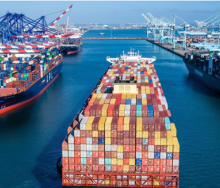Freight sector service providers in the US are urging shippers to ensure contingency plans are in place in anticipation of a potential strike on the East and Gulf Coast ports next week.
This is after negotiations between the International Longshoremen’s Association (ILA) and the US Maritime Alliance (USMX), which represents terminal operators, have reached a deadlock over a new labour contract expiring on September 30.
Subsequently, the ILA’s leadership has indicated that a strike by its members may begin on October 1.
In response to the likelihood of a strike, logistics companies have already begun implementing precautionary measures.
Norfolk Southern, a major Eastern US Class I railroad, has informed customers via a service advisory that it has initiated steps to mitigate the potential operational impacts across its rail network, including at its intermodal facilities.
The company has recommended customers to avoid shipping hazardous, high-value, and refrigerated international cargo by rail to prevent unexpected delays at port destinations affected by the anticipated port curtailments. Should such shipments reach the ports before closures, Norfolk Southern assured customers it would make every effort to deliver them prior to any work stoppage.
Meanwhile, 3PL service provider CH Robinson Worldwide has noted that ocean carriers have started to restrict their acceptance of cargo bound for East or Gulf Coast ports.
Although shippers have undertaken some degree of pre-emptive shipping in preparation for the potential strike, it is ultimately customers who decide whether to redirect cargo to West Coast ports, according to George Goldman, president and CEO of CMA CGM’s presence in North America.
Goldman explained that, as of last week, no vessels had been diverted to the West Coast in anticipation of the strike, as customers had yet to take that decision.
The operational adjustments currently under way aim to avert a potential cargo backlog in the event of a strike.
Seko Logistics has warned that should the strike go ahead, significant congestion and halted operations at major ports can be expected.
They also noted that ports in the US Northeast are already experiencing slowdowns due to a recent influx of imports and challenges associated with returning empty containers.
In light of the looming deadline, the South Carolina Ports Authority, along with the ports of Houston and New Orleans, have announced extended gate hours ahead of 30 September.
The Federal Maritime Commission has also issued a reminder that all its regulations will remain in force during any terminal closures that may occur due to a potential work stoppage at affected ports.
As transportation and logistics firms brace for the possibility of a strike, the ILA and USMX continue to vie for public support.
On 23 September, USMX expressed its frustration, stating that, despite its efforts to resume negotiations, it had been unable to arrange a meeting with the ILA to continue bargaining.
The USMX reiterated its willingness to engage with the Federal Mediation and Conciliation Service to facilitate discussions, but noted that no indication had been given that the ILA was interested in resuming talks.
In contrast, the ILA has accused USMX of conducting a misleading publicity campaign, claiming that the two sides had been in frequent communication in recent weeks.
The ILA maintains that its principal grievance remains the "unacceptable" wage increase proposed by the USMX.
But ILA’s international president and chief negotiator, Harold Daggett, emphasised that ILA members would not accept what he characterised as insulting offers, given the nature of the work performed by longshore workers and the substantial profits made by the companies involved.
Daggett also asserted that the responsibility for any coast-wide strike lay squarely with the USMX.













